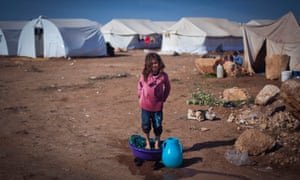' “The challenge we face now is to transform these possibilities into the reality of an agreement,” U.S. Secretary of State John F. Kerry declared, referring to a “basic framework” for a united, non-sectarian Syria.
Those words mean nothing to the fighters on the ground, who continue to push for more territory. In Aleppo, missiles fall and helicopters whir in the sky. In Daraya, a suburb of Damascus that has been besieged by Syrian government forces since 2012, 8,000 inhabitants are starving.
In August 2012, I defied government rules by sneaking into Daraya after what locals had called a massacre and the government called a prisoner swap gone wrong. Three hundred people were dead. One of the first witnesses I met was an injured man, a mechanic, searching for his elderly father. They had been separated during the fighting and the mechanic had lost his eye. The smell of dead bodies was overwhelming. We searched for a while, together, and the mechanic eventually found his father's body, rotting, in a farmhouse outside of town.
“This is not my Syria,” he told me, weeping. “This is not my Syria.”
“This is not my Syria,” he told me, weeping. “This is not my Syria.”
I spent four years gathering testimonies in my notebook. I met Nada, a young activist from Latakia, who was taken from her home, placed into a tiny cell and beaten and raped for months by government police and security services. “They used my body to practice their judo moves.”
Hassan, a law student from Homs, was tortured by regime physicians who operated on him without anaesthetic. He escaped by pretending to be dead and was tossed on top of a pile of corpses. One of them was his brother's.
But the worst was the little boy who followed me around a displaced persons camp near Azaz. He had no face, only a hole for a mouth and a hole for a nose. His father told me the story of hearing “the worse thing in the world, the screams of your own child’s pain” after his son was struck by a rocket inside his home in Hama.
Hassan, a law student from Homs, was tortured by regime physicians who operated on him without anaesthetic. He escaped by pretending to be dead and was tossed on top of a pile of corpses. One of them was his brother's.
But the worst was the little boy who followed me around a displaced persons camp near Azaz. He had no face, only a hole for a mouth and a hole for a nose. His father told me the story of hearing “the worse thing in the world, the screams of your own child’s pain” after his son was struck by a rocket inside his home in Hama.
The war in Syria will eventually end, and the battered country will be sewn back together. But we missed many opportunities to prevent the war, or to stop it. The initial days of the uprising might have been a time for the U.S. to pressure Assad not to kill his own people. The crossing of the chemical weapon “red line” in 2013 was another chance.
But the war continued, as did the death toll. How do we explain – to the living, to the survivors, to the orphans, to those who lost homes, families and livelihoods – how we stood back and did nothing?'
But the war continued, as did the death toll. How do we explain – to the living, to the survivors, to the orphans, to those who lost homes, families and livelihoods – how we stood back and did nothing?'




